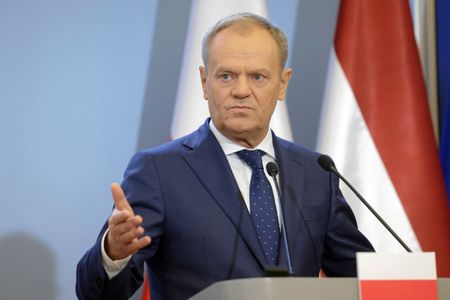By Barbara Erling and Marek Strzelecki
WARSAW (Reuters) -Poland’s military intervened after a ship from the Russian “shadow fleet” was seen performing suspicious manoeuvres near a power cable connecting Poland with Sweden, Poland’s prime minister said on Wednesday.
NATO has stepped up security in the Baltic following a string of incidents in which power cables, telecom links and gas pipelines were damaged in the wake of Russia’s invasion of Ukraine in February 2022.
“A Russian ship from the ‘shadow fleet’ covered by sanctions performed suspicious maneuvers near the power cable connecting Poland with Sweden,” Prime Minister Donald Tusk wrote on X. “After the effective intervention of our military, the ship sailed to one of the Russian ports.”
“Shadow fleet” refers to vessels used by Russia to ship oil, arms and grains in violation of international sanctions imposed after the Ukraine invasion.
Speaking later to reporters, Polish Defence Minister Wladyslaw Kosiniak-Kamysz said a patrol flight scared the ship off and said the Polish Navy’s ORP Heweliusz was sailing to the scene.
Vice Admiral Krzysztof Jaworski, Poland’s maritime component commander, told Reuters that the tanker in question was called Sun and it sailed under the Antigua flag.
The Russian embassy in Warsaw declined to comment. In the past, Moscow has denied involvement in undersea sabotage in the Baltic, saying the West was using such claims to curb Russia’s sea-borne oil exports.
The 600-megawatt undersea cable links the Swedish coast near Karlshamn with Ustka in northern Poland and allows both grids to rely on cross-border supplies when electricity is cheaper in the other system.
A spokesperson for Polish grid operator PSE said the cable was working. PSE data showed over 600 megawatts were flowing to Sweden through the cable at 1130 GMT.
“This shows how dangerous the times we live in are, how serious the situation in the Baltic Sea is,” Kosiniak-Kamysz told a news conference.
“Since Sweden and Finland joined the North Atlantic Alliance, the Baltic Sea has become a key marine area, where the largest number of incidents occur, the most common incidents related to cable breaks… and sabotage.”
He vowed a “firm response” from Poland and NATO to any attack on Baltic Sea infrastructure.
Stockholm, asked about the incident, said Swedish authorities were ready to respond to developments in the vicinity.
“We are in contact with the authorities and our allies regarding developments affecting the security situation,” Swedish Defence Minister Pal Jonson said in an emailed comment.
(Reporting by Alan Charlish, Pawel Florkiewicz, Marek Strzelecki, Barbara Erling, Terje Solsvik, Stine B Jacobsen; additional reporting by Anna Ringstrom; Editing by Alex Richardson, Tomasz Janowski and Leslie Adler)








